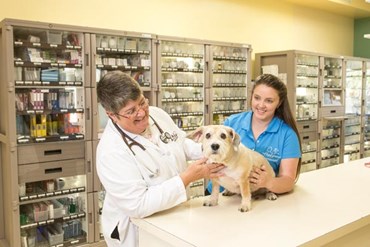Breed Specific

Many dogs are born with structural abnormalities resulting from their specific breeding style. These structural abnormalities may be harmless and generally unnoticeable in your pet's daily life. However, many times breed specific abnormalities may cause discomfort and disease in your pet, requiring breed specific surgery to restore proper physical functioning.
Brachiocephalic breeds (bulldogs, pugs, bull mastiffs, french mastiffs, french bull dogs, pekingese, lhasa apso and boston terriers) are bred with shortened heads to create a unique, desirable look. Unfortunately, when a dog is bred with a shortened head, soft tissue structures can be inhibited from proper development and function, resulting in brachiocephalic syndrome or a variety of breed specific respiratory problems. Some of the abnormalities associated with brachiocephalic syndrome include:
- Stenotic nares (narrow nostrils)
- Elongated soft palate
- Hypoplastic trachea (abnormally small trachea)
- Everted laryngeal saccules
Each of the conditions associated with brachiocephalic syndrome can obstruct airflow, putting your pet in danger for a respiratory emergency. If your pet is a brachiocephalic breed of dog, it is extremely important to watch for serious symptoms such as excessively loud snoring, frequent panting, exercise intolerance, coughing and collapse. Mild symptoms may be managed conservatively by preventing your pet from entering hot, humid conditions, decreasing stressful situations, staying in air conditioning during the summer months, and using a harness and avoiding obesity.
Patients with moderate to severe symptoms will require surgery to restore proper respiratory functioning and avoid dangerous emergencies. Early correction of an elongated soft palate and stenotic nares can prevent the development of everted laryngeal saccules, proactively reducing discomfort and injury to your pet. Our experienced surgical team safely and effectively performs the following surgical procedures to correct breed specific conditions:
- Correction of stenotic nares (wedge resection) involves taking a triangular shaped piece of tissue from each nostril, thereby closing the gap between each piece of tissue, and creating a larger nasal opening for necessary air flow.
- Elongated soft palate resection is a procedure that involves removing just enough of the soft palate to allow for necessary air flow and reduced snoring.
- Everted laryngeal saccule removal is a rarely needed procedure that is reserved for extreme cases when stenotic nare correction and elongated soft palate resection have been unsuccessful in reducing airway obstruction.
Several other breeds are affected by structural abnormalities, including the cocker spaniel, beagle, shar pei, german shepherd, golden retriever and labrador retriever. These dogs may require the following surgical procedures to restore proper physical functioning and prevent further danger through unwanted infection:
- Tail amputations are typically performed on pugs, boston terriers and bulldogs when the shape, size and skin fold of the tail cause chronic bacterial and fungal infections. By removing the portion of the tail causing infection, the affected area will receive increased airflow, and reduce the amount of unwanted bacteria and fungus causing moisture.
- Repair of prolapsed tear gland of the third eyelid (Cherry Eye) is common in cocker spaniels, boston terriers, bull dogs, beagles, and shar peis. The prolapse is caused by a defect in the tissue that anchors the gland to the eye. Surgery works to move the gland to its normal and correct position, and is necessary to prevent the risk of dry eye.
- Vulvoplasty is a procedure performed when there is an excessive skin fold over a female dog’s vulvar area. Although there has been no definitive breed predilection, golden retrievers, labrador retrievers and german shepherds are most frequently affected. Dogs that have this fold usually have recurrent urinary tract infections and chronic skin irritation. Vulvoplasty involves removing the excessive skin fold, thereby eliminating any future cases of urinary tract infection.
If you're curious about breed specific conditions that may affect your dog, we recommend you set up a consultation so that we may evaluate your dog and support you in preventing unwanted injury or infection in your pet.
We want to help you stay well informed about preventive pet health care. Explore our pet health resources and advice below to learn more.










